- Home
- Jack Gantos
Jack's New Power
Jack's New Power Read online
For Anne
Table of Contents
Title Page
Dynasty
Purple
Love
New Power
The Pistol
Thurston Branch
Man’s Man
Fire
THE JACK HENRY ADVENTURES
Copyright Page
Dynasty
We were not allowed to swim in the ocean far below the Edgewater Hotel because we were on the rough side of the island. The “windward” side, Dad had called it. It was rugged and gusty, and the blue waves arrived in towering rows all the way from Africa. They glided across the ocean like a conquering navy and crashed against the shore, which was fortified with huge skull-shaped boulders crowned with spikes of sharp rock. The waves kept coming, but Barbados didn’t budge an inch. I figured if a wave ever hurled me against one of those prickly skulls I’d be gutted like the fish we had been eating for dinner each night.
There were small inlets of pink sandy beach as smooth and soft as slices of melon, but signs everywhere warned about the undertow. And we had been lectured by Dad against going down the steps carved into the face of the coral rock to play on the beach. Just to make sure we wouldn’t get near the ocean, he told us the story of the two German girls. He gathered us on the wooden balcony overlooking the shore. The wind was briny with salt spray and blew our hair and clothes to one side, so that we looked like the small, twisted trees bent toward the land.
“Come here,” he hollered to the three of us. We huddled around him and watched his every move. He pulled up on the crease of his cream pants leg and lifted his brown shoe onto the lower rung of the balcony. I did the same. Pete did what I did. Betsy looked impatient and scratched a mosquito bite on her ankle.
He removed a cigarette from his case and tapped the filter against the face of his watch. Then, in one quick motion, he snapped open his lighter and shielded the flame with his free hand as he drew in a breath so deep his cheeks pressed against his teeth and bones like a mummy. Dad was warming up to telling a really good story.
“All Germans can read English,” he started, and raised a finger to mark his first point. “But the girls ignored the red warning signs and were swept out to sea by the undertow.” He pointed to the breakers, which slapped and fanned over the beach, then receded into the bottom of the following wave. “Still, they got a second chance. A Canadian father and son were on the shore and spotted them as they desperately waved their arms for help. ‘Stick with me,’ the father said to his son. They bravely dove into the water, but the son couldn’t keep up. They never reached the girls and the girls never reached the shore. The father was also dragged out to sea. Only the son was washed back onto the beach. You can imagine just how that boy felt for not staying by his father’s side.”
I did imagine. He would have dropped to his knees on the shore and pounded his chest with his fists while the waves washed up over him. Somehow, I figured, the father was punished because the son was weak. I promised to do everything my father asked of me. Never again would I lie or cheat or misbehave. I’d be strong and brave and smart. I looked over at Pete. He had covered his eyes with one hand. I could tell he was thinking the same thing I was: Stick with Dad. Don’t let him down.
Dad continued. “A week later, what was left of the three bodies washed ashore on Crane Beach, some twelve miles away. The sharks had gotten to them first, then the crabs. You can just imagine how horrid they were,” he whispered and gazed dreamily out to sea. “They looked like bloated lepers.” He took a quick pull on his cigarette, then flicked it over the balcony. The wind blew it back against the cliff. He bowed his head in respect for the dead.
“I think they get the message,” Mom piped in just as I was forming a spongy, rotting picture of “bloated lepers” in my mind. She had crept up on us for the gruesome ending. I stared at the maroon paisley scarf she had fixed around her head to keep her hair in place. With the spooky mood I was in, each paisley design looked like a thick dollop of blood.
Dad snapped out of his daze and curled his arm around Mom’s waist. “We’ll be in the lounge if you need us,” he announced with a sudden new energy. The lesson was over.
“You all play by the pool,” Mom ordered. “Betsy, keep an eye on the boys. You know how they get.”
That was one of the differences between Dad and Mom. Dad could get us worked up to do anything he wanted by telling us a lesson story with a tragic ending. Mom just went right to the point and told us what to do. Even though she was pushier, he was more convincing.
Pete and I ran up to our room. We didn’t have to share it with Betsy, who was stuck with the baby. This meant we could wrestle and make all the noise we wanted and sneak out at night to raid the bar for bottles of lemon soda.
We had been living at the Edgewater Hotel for a week. Dad had flown down from Fort Lauderdale a month before us. When we joined him, our house wasn’t ready, so he checked us into the Edgewater because it was close to where he was fixing up a large private track club called the Round House. He took us to see it. It was the most beautiful building I had ever seen. It was pure white and sparkled with “diamond-dust plaster,” as Dad put it. The walls were round as a cake, and it had an orange tin roof as tall and pointy as a party hat. There was a little red flag in the shape of a horse sticking out the top. The driveway gravel was pink and reminded me of candy hearts. I picked up a piece and licked it. If it had tasted sweet it would prove we were living in a fairy tale. It tasted like clean dust and I spit it out. It really didn’t bother me that we weren’t living in a fairy tale. Living on Barbados was pretty close.
We threw our clothes off and pulled our new bathing trunks up over our skinny white legs. After we knotted the drawstrings inside our waistbands, we ran down to the pool. Betsy had settled on a lounge chair to read a book. The baby was asleep in his carriage under a striped umbrella with fringe around the edges.
Pete and I gathered up a garden hose, a big rock, and my swim mask. We were playing a game we called “Deep-Sea Diver” after a movie we had seen in the television room. I was the diver and Pete was my air-pump and support crew. Anyone who dove into the pool would be a giant squid. If they touched me, I was strangled to death.
I put on my mask, stuck one end of the hose in my mouth, picked up the rock, and jumped into the deep end. I held my breath and sank to the bottom. I exhaled out of the corner of my mouth and watched the silver-and-blue bubbles go all the way up to the blurry surface. Then I breathed through the hose. It worked. There was air flowing through. I exhaled and took a deep breath. Then I held the hose with my right hand and tugged on it twice. That was the signal. In a moment I could taste lemon soda mixed with some funky inner-hose scum. Then there was more soda, and more. I needed to breathe. I pulled on the hose. The soda slowed to a trickle, then stopped.
This was great. I could have stayed there the entire day. Pete could feed me olives, raisins, and little Vienna sausages all washed down with my new favorite soda, Lemon Squash.
I was thinking that the air was getting a little thin and it would be a good idea if we had a bicycle pump to hook on to the hose so Pete could pump fresh air to me. Suddenly the hose was jerked out of my mouth and I swallowed a lungful of water. I pushed the rock to one side and sprang up toward the surface. “Why’d you do that?” I sputtered.
“Come quick,” Pete said and pranced up and down on his toes as if he had to pee. “Dad’s drowning.”
I dragged myself up over the stone edge of the pool and grabbed a towel as we ran toward the lounge. No one was inside. They were all out on the back balcony, peering down toward the rocks and rolling ocean and pointing at two tiny heads bobbing up and down over the huge swells. I could tell right away that with each pa
ssing wave they were drawn closer and closer to the prickly rocks. In a few minutes they’d be dead, pinned to the sharp spikes like prize butterflies. I also knew that neither of them was Dad. He wasn’t even in the water yet.
He was running across the beach. Without slowing, he pulled his shirt over his head, kicked off his shoes, unbuckled his trousers and hopped out of them, and waded into the water. He dove forward and began to swim. His arms and legs kicked up whitewater as he raced to reach the couple before they struck the rocks. It was going to be close.
“He’s going to die!” Betsy screamed. She was scared and angry. “Stop him! He’s insane!”
“He’ll be okay,” Mom said, and took a deep breath. She stood behind Betsy and held her shoulders. “He’s a good swimmer.”
He was. When we had lived on Cape Hatteras, he swam in the ocean all the time, right next to the signs warning everyone about the undertow. I was small then and thought undertow meant that if you stuck your toe into the water you got pulled under and drowned. It wasn’t quite like that. What it meant was that if you were swimming close to the shore a current of water could pull you straight out to sea and keep you from swimming back in. It didn’t pull you under, but eventually you got tired and drowned. I knew there was only one way to beat an undertow. Once it carried you out to sea, you had to swim parallel to the shoreline for a while and then head in to the beach. That way, you swam beyond the control of the undertow current and lived to tell about it.
“He knows what he’s doing,” I said to Pete. “Watch him.”
Pete covered his eyes and peeked between his fingers. He still hadn’t learned to swim and was terrified of the water.
“He’s not even getting tired,” I said, elbowing Pete. “Keep your eyes open, you’ll learn something.”
Just then Betsy fell out of Mom’s grip and slumped to the floor. As soon as she landed on her rear, she hopped up and started screaming and swinging her arms.
“She’s hysterical,” said the bartender. “I’ll get her a brandy.” He ran off and returned with a golden drink and poured it down her throat. She spit most of it right out, but it worked. She stood on her own two feet and stopped struggling. Mom stroked her hair and quietly whispered in her ear. Someone brought a blanket and draped it over her shoulders.
Dad was still going strong. He swam up the swells, then down into the gullies, then up again, until he had almost reached them. And then he stopped. They were about twenty feet from the neck of an enormous rock with points as sharp as swords. All around its base was a circle of foam where the waves had surged up against it and angrily slid down.
He wanted to calm the couple before making his move. He made a lot of hand gestures, then went forward with his plan. He swam up to the woman, turned her onto her back, and held her across the chest before she could struggle. Once he got her into position, he did a sidestroke and slowly angled down the beach and away from the undertow. The man followed. Stroke by stroke they pulled away from the rocks as the swells curled beneath them.
A group of men and women scurried down the steps to the beach, forming a human chain into the water.
“Can I go, too?” I asked Mom.
“No,” she replied. “You kids stay up here with me.” Dad had also told us all another true ocean story. Two children and their parents were on a small sailboat in a storm. The wife was hit by the swinging boom and knocked overboard. She went straight down into the dark water. The father tried to jump overboard to save her, but the children grabbed him and held him back. They could live with one missing parent, but not two. They would never know if the father could have saved the mother.
Mom didn’t want to lose more than one. But she wouldn’t have to. Dad had gone far enough downshore and had turned toward the beach. There was no undertow running against him. The waves carried him forward. The swells turned into breakers and they rode in as if on white horses. The chain of people grew longer and in a minute they had him. Then the woman. Then the man.
Two men dragged Dad ashore, where he sat slumped forward, with his head resting between his knees. Finally, once he got his breath back, he looked up at us and waved.
We waved back, wildly. I was so proud of him. He was a hero. No one else risked his life to save that couple. Even if someone had, he would have drowned. But Dad was fearless. I knew I couldn’t have done what he did. But since he was my dad, it was almost the same thing. After all, I was named after him. I was a chip off the old block … If he could do it, I could do it.
A circle of men and women gathered around him and helped him to his feet. Then the entire procession climbed the steps and appeared up over the cliff. Betsy threw off her blanket and ran at him with her arms open. He picked her up and swung her over his head, then back to the floor, where she pressed her face into his chest.
Pete and I took a hand each as Mom kissed his face and smoothed his hair.
“Drinks for everyone,” Dad announced, his eyes flashing around the room. He was in good spirits. He pulled his hand from my grasp and swung around to point at the couple he saved. They were gone. Everyone fanned out to find them, but they had vanished. I stared out at the ocean to see if they had gone back in. Maybe they wanted to drown themselves like mysterious lovers who throw themselves off a cliff.
“Well, whoever they are,” Dad said with a quick laugh, “put it all on their bill.”
Everyone cheered.
By the end of the evening, the only thing we knew about the couple was that they were British, were on their honeymoon, and, as Dad put it, “were as dumb as dirt for swimming in water that could flip a battleship.”
In the morning, they had checked out.
Two days later we were sitting at dinner when the waiter brought Dad a cable. He ripped the envelope down the side and removed the message.
“Well, what do you know,” he said after a moment. “I saved some British royalty.”
“Let’s see,” Betsy said, squealing, and snatched the cable from his hand.
“Read it out loud,” said Mom.
“SORRY TO HAVE RUN OFF STOP COULDN’T HAVE PRESS INVOLVED STOP EVERY MEMBER OF OUR FAMILY THANKS YOU AND YOUR FAMILY STOP WHEN IN ENGLAND CONTACT LORD AND LADY JEFFRIES DUKE AND DUCHESS OF SUSSEX STOP 01-704-9776 ETERNALLY GRATEFUL.” She lowered the cable and sighed.
“Now, that is what I call a happy ending,” Dad said.
Mom didn’t think so. “I call it rude,” she pitched in. She was still annoyed because Dad had risked his life and they didn’t have the manners to say thank you to his face.
“Can we call the number?” Betsy asked.
“We’ll see,” Dad replied.
“I’d love to be British,” Betsy said, swooning. “They are so great. Every family has so much history to them. Like the Duke of Marlborough. Or the Viceroy of Firth. Or the Duchess of Windsor. And then there’s us. The Henry family. Now, that does not sound like greatness.”
“Wait a minute,” Dad cut in. “We’re Americans and we build great families the American way.”
Betsy raised her eyebrows. “And how might that be?”
“First,” he replied, “Americans don’t have royal families. We have business families, political dynasties, powerhouse sports families. Americans don’t have to be born into greatness. We can make ourselves great. That’s the American way.”
Betsy smirked. “The American way is nothing but a rat race. I’d rather win the lottery and move to Europe.”
I was staying out of this discussion. Somehow I knew it would lead to something bad. I stared up at the dining-room walls. Just below the ceiling beams were a series of British coats of arms in the shape of little shields. On the shields were pictures of lions and eagles and fearless men in armor and words such as honour, courage, wisdom. The British used to own Barbados and had left a lot of their old stuff behind once the island gained independence. It would be neat, I thought, to have a Henry Family coat of arms.
Dad’s voice became louder. “All great families begin t
heir road to greatness by facing their fears. So that’s how we’ll begin.” Suddenly he pointed his butter knife at my nose. “Jack, what’s your greatest fear?”
My mouth was filled with a huge chunk of bread. Mom, Betsy, and Pete turned to look at me. I couldn’t say a word. I just chewed and chewed. For a moment I thought my greatest fear was choking to death.
“Take your time,” Dad said warmly, giving me room. “Dig deep inside yourself and think of something that gives you the shivers, really makes you break out in a cold sweat and want to run away like a coward. Well? Come on. Time’s up. What’s it going to be?”
I swallowed hard. “’orses,” I managed to mutter.
“Huh? Speak up,” Dad insisted, leaning closer. “Don’t be so afraid that you can’t even say it.”
I took a quick sip of water and swallowed. “Horses,” I said. “I’m afraid of horses.”
Dad made a face. “Is that it?”
“Yeah,” I replied. “I’m afraid of being kicked by a horse.”
“Well, that’s a beginning,” he said. “Once you get over that, we’ll move on to something more important.”
He turned toward Pete. I sighed and thought of standing behind a horse and having it kick me on the forehead with a ten-pound steel shoe attached to its deadly back hoof. Just the thought of it made my shoulders flinch.
Pete had taken advantage of the two minutes it took me to ruin myself.
“Water,” he blurted out and started to twist his face up in a panic. “I can’t swim.”
“We’ll fix that,” Dad announced and waved his fork as though it were a magic wand. I half expected Pete to jump up, run across the dining room to the patio, dive into the pool, and swim like a dolphin.
“Betsy?” Dad said. “Let’s hear it.”
“Okay,” she replied. She had used the time to organize exactly what was on her mind. “I’m afraid I’ll call the number on this cable and they’ll ask me who I am, and who I know, and who were my ancestors, and I’ll tell them we are the Henry family and they’ll reply, ‘Henry? Are you servants? We don’t recall any Henry family.’ And they’ll hang up because we are a bunch of nobodies.”

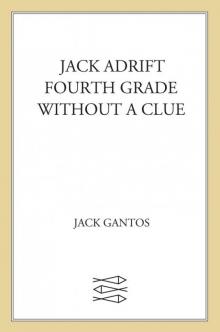 Jack Adrift
Jack Adrift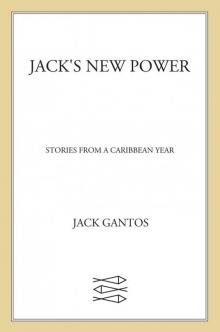 Jack's New Power
Jack's New Power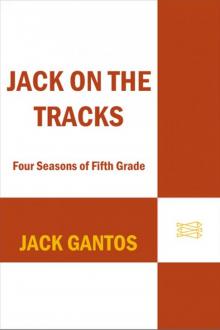 Jack on the Tracks
Jack on the Tracks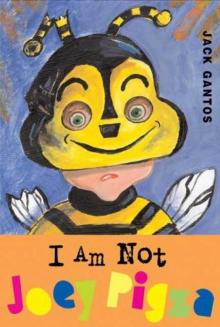 I Am Not Joey Pigza
I Am Not Joey Pigza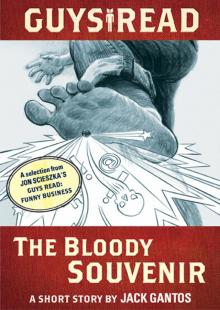 The Bloody Souvenir
The Bloody Souvenir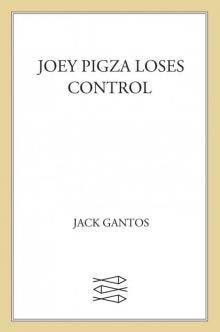 Joey Pigza Loses Control
Joey Pigza Loses Control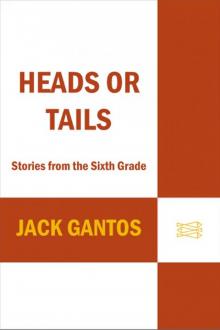 Heads or Tails
Heads or Tails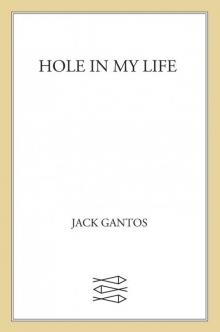 Hole in My Life
Hole in My Life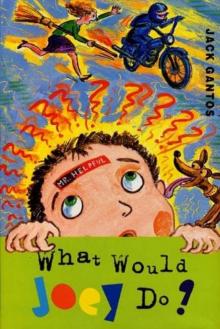 What Would Joey Do?
What Would Joey Do?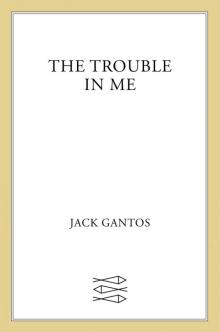 The Trouble in Me
The Trouble in Me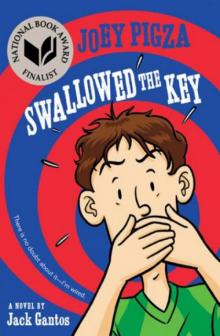 Joey Pigza Swallowed the Key
Joey Pigza Swallowed the Key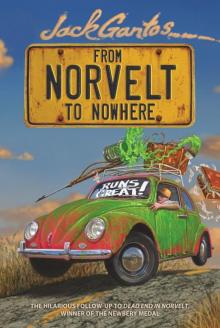 From Norvelt to Nowhere (Norvelt Series)
From Norvelt to Nowhere (Norvelt Series)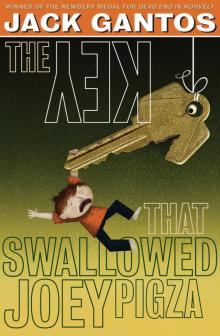 The Key That Swallowed Joey Pigza
The Key That Swallowed Joey Pigza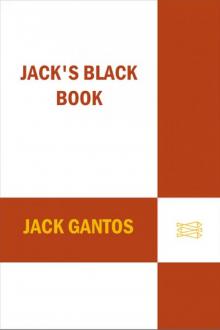 Jack's Black Book
Jack's Black Book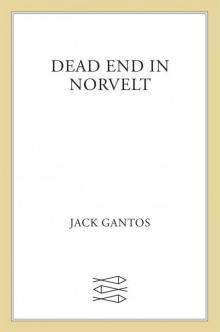 Dead End in Norvelt
Dead End in Norvelt